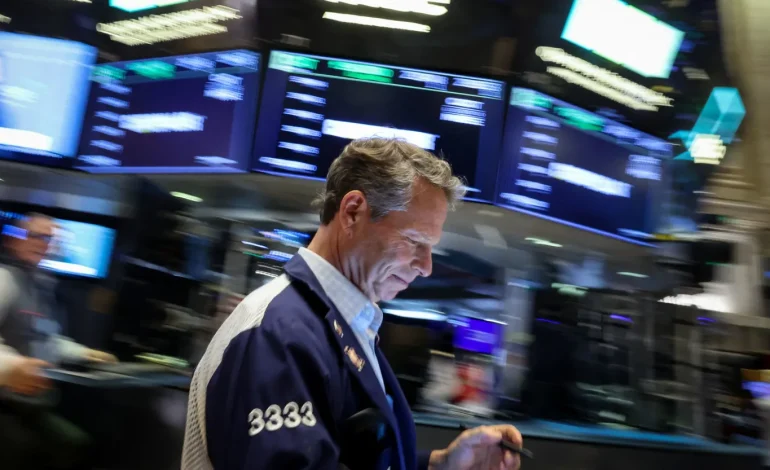US stock futures fell early Wednesday as investors responded to a sharp drop in Nvidia shares and braced for the release of key retail sales data, which could offer new insights into consumer sentiment and the broader economy.
As of early trading, Dow Jones Industrial Average futures were down 328 points, or about 0.8%. The S&P 500 futures slipped 1.49%, while Nasdaq 100 futures fell more steeply by 2.29%, led by losses in major technology stocks.
Nvidia was a central focus for markets after the chipmaker revealed it expects to take a $5.5 billion charge in the current quarter, tied to US export restrictions on its H20 artificial intelligence chips sold to China and other countries. Shares of Nvidia dropped more than 6% in extended trading following the announcement. The charge reflects inventory, purchase commitments, and related reserves tied to the restrictions.
The company’s outlook comes amid rising tensions between Washington and Beijing over technology exports. The US government recently informed Nvidia that a license will now be required for H20 chip exports to China, a policy that Nvidia said will remain in effect indefinitely. Analysts noted that while the financial hit is significant, Nvidia may be able to absorb the cost, though the broader implications for the semiconductor sector remain uncertain.
Global markets also responded to ongoing trade concerns. In Europe, the Stoxx 600 index opened down 1%, ending a short two-day rally. Germany’s DAX and France’s CAC 40 each fell around 1%, while the UK’s FTSE 100 lost 0.44%. Semiconductor companies were among the hardest hit. ASML, a key supplier of chipmaking equipment, missed expectations on net bookings for the first quarter, citing demand weakness and global uncertainty tied to tariff policies. Its shares dropped 6% in early trading.
Asia’s major indices also closed lower, with Japan’s Nikkei and South Korea’s Kospi each down more than 1%, and Hong Kong’s Hang Seng Tech Index sliding 3.3%.
Adding to investor caution, Allianz’s chief economic advisor Mohamed El-Erian warned that the current market calm may be short-lived.
“Fundamentally, the game of chicken between China and the US continues,” he said.
Later Wednesday morning, markets will turn their attention to March’s US retail sales report. Economists polled by Dow Jones expect a 1.2% increase, a notable rise from February’s 0.2% gain. The data comes at a time when inflation concerns and economic uncertainty continue to weigh on consumers.
Other key data points include industrial and manufacturing production figures, while the earnings season continues with reports expected from major firms such as Travelers, US Bancorp, Abbott Labs, ASML, and Citizens Financial.
Meanwhile, bond yields remained relatively stable. The two-year US Treasury yield dropped 3.5 basis points to 3.793%, while the 10-year and 30-year yields fell to 4.302% and 4.762%, respectively. In Europe, bond yields also declined, with the German 10-year Bund yield down 5.5 basis points to 2.488%.
In commodities, gold extended its rally, rising 2.3% to $3,312.40 an ounce. Oil prices edged lower, with Brent crude down 0.6% at $64.26 per barrel and West Texas Intermediate crude slipping 0.7% to $60.90. Natural gas futures in Europe fell 0.3%.
Currency markets saw the US dollar weaken amid investor doubts about the strength of US economic leadership. The dollar index fell 0.8%, while the euro rose 0.9% to $1.1382. The yen gained 0.7%, with the dollar trading at 142.175 yen.
CNBC, the Wall Street Journal, and BBC contributed to this report.










The latest news in your social feeds
Subscribe to our social media platforms to stay tuned